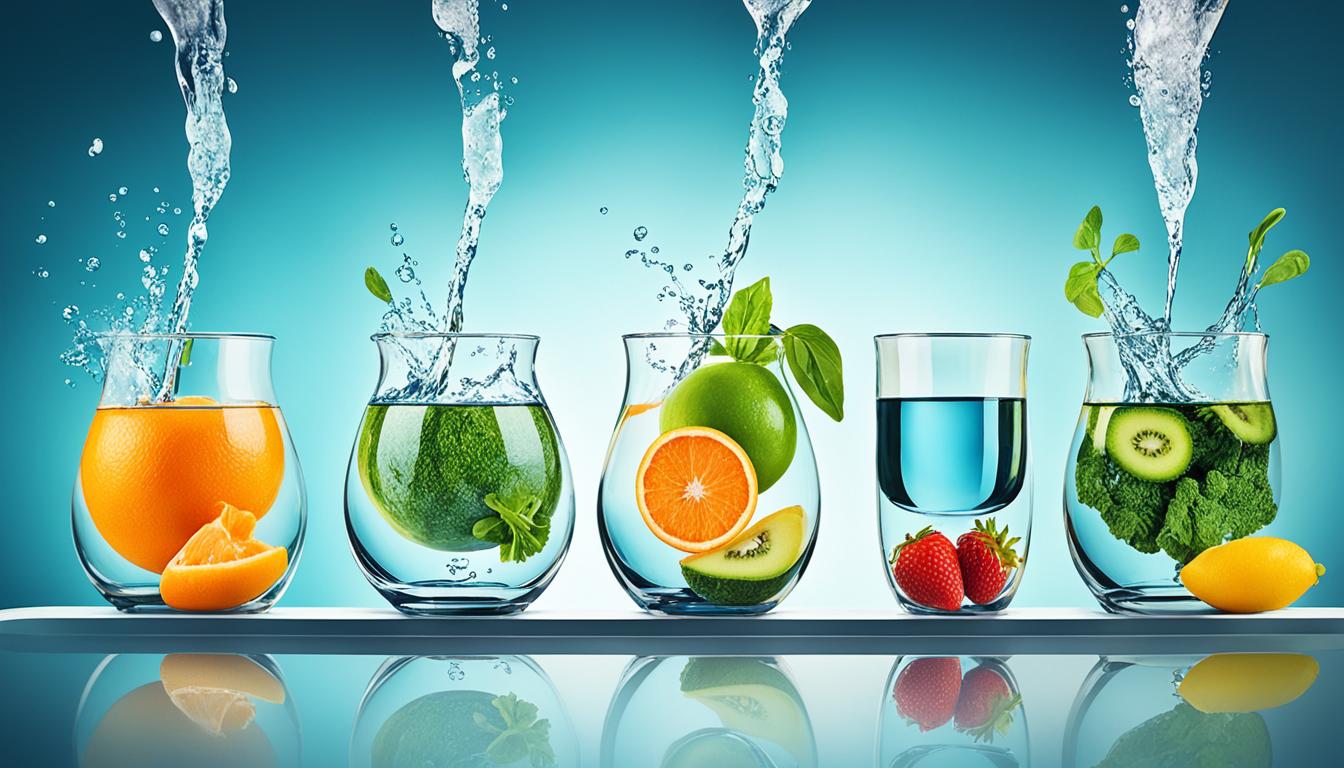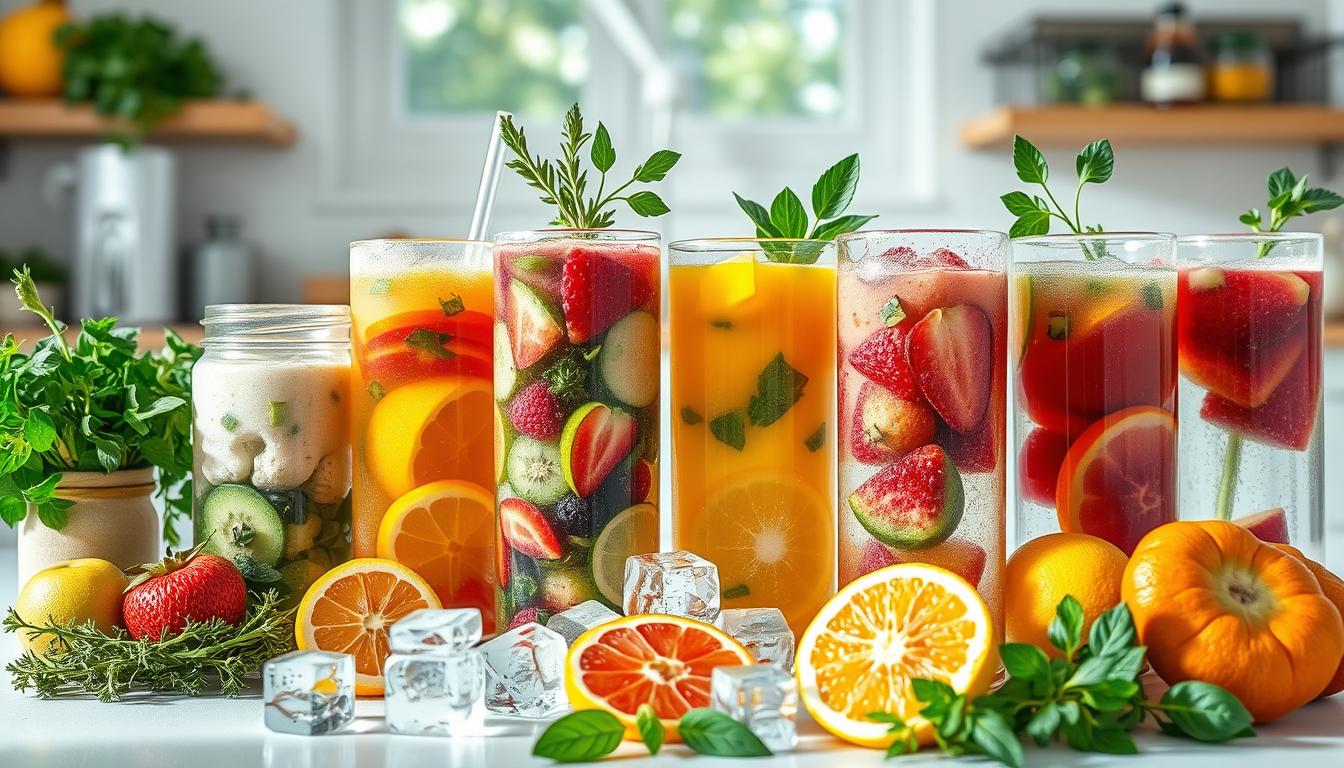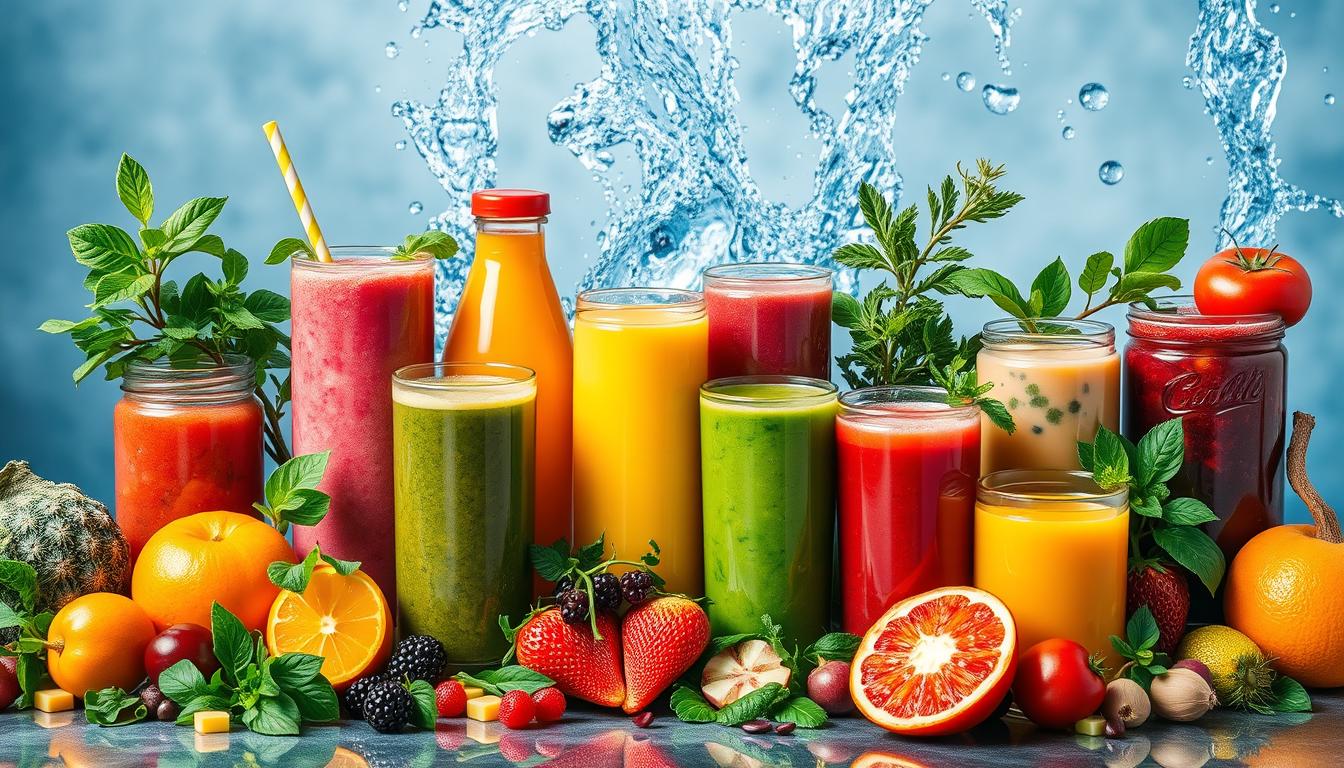Starting a water weight loss first week diet can excite those looking for quick results. Choosing fresh foods over salty, processed ones can quickly reduce water weight. This decrease is a good sign for dieters. Yet, it’s crucial to know that this early weight drop is mostly water, not fat. For lasting success, mix cutting calories with more exercise. This balance is vital for long-term weight management.
Key Takeaways
- Significant initial weight loss is commonly attributed to water loss, not fat.
- Increasing water intake and reducing sodium can lead to quick water weight loss.
- Water weight fluctuates, so the first week’s weight loss should set expectations accordingly.
- For sustainable results, incorporate a balanced diet and regular exercise into your routine.
- Adopt water weight loss tips that focus on long-term health and wellness goals.
Understanding Water Weight Loss in Your Diet Journey
The path to managing weight often starts with learning how to lose water weight. At the beginning of dieting, there’s usually a big drop in weight. This is mostly due to losing water, not fat. This early success can make you feel good and keep you going on your weight loss journey.
The Role of Glycogen and Water Retention
Glycogen is crucial for storing energy and is linked to holding onto water. It’s mainly found in our liver and muscles. Because it’s stored with water, it adds to our total weight. Cutting carbs makes our body use glycogen for energy. This releases water and leads to a noticeable reduction in losing water weight in a week.
Debunking Myths Surrounding Water Weight and Fat Loss
There are many wrong ideas about water weight and fat loss. It’s key to know the difference between the two. Quick weight loss is usually not fat being lost. Real fat loss needs eating fewer calories—a must for keeping weight off long-term. For the best way to lose water weight, eat well and exercise regularly. Avoid quick fixes from fad diets.
| Weight Loss Type | Water Weight Loss | Fat Loss |
|---|---|---|
| Timeframe | Rapid, typically within the first week | Gradual, over an extended period |
| Strategy | Reduce carbohydrate intake | Create a caloric deficit |
| Measure of Success | Liter of water lost | Calories burnt equating to 3,500 per pound of fat |
| Sustainability | Short-term effect | Long-term lifestyle change |
Initial Weight Loss: Is It Fat or Water?
When you start a new fitness plan, you may quickly lose weight. But it’s crucial to know what that weight loss means. Is it from losing fat, or is it because of losing water? Knowing this helps you set real goals and make effective water weight loss strategies.
The Science of Early Weight Loss
The first weight loss is mainly water, not fat. Eating lots of carbs makes your body hold water. Once you eat fewer carbs on a water weight loss diet plan, your body uses its stored energy. This releases water and causes fast weight loss.
Interpreting Your Scale: Contextualizing Sudden Drops
Seeing a big drop in weight right after starting your diet is exciting. Yet, this quick drop is mostly your body losing reduce water weight fast, not fat. It’s a good sign if you know what it means and keep it in perspective.
| Week | Type of Weight Loss | Typical Range of Weight Loss | Primary Contributing Factors |
|---|---|---|---|
| 1 | Water Weight | 2-6 pounds | Decrease in carb intake, increased water consumption, reduction in sodium |
| 2 onwards | Fat Loss | 0.5-2 pounds | Continued exercise, caloric deficit, ongoing hydration |
Knowing why you lose weight at the start helps you keep going. It helps you stick with good habits for long-term fat loss.
Realistic Expectations for Water Weight Loss First Week Diet
Starting a water weight loss diet plan brings hopes of quick success. Yet, knowing what’s really possible in the first week is key. Often, early weight loss is mostly water, as the body uses up glycogen. It’s crucial not to see this as lasting fat loss.
Effective water weight loss strategies need a broad approach. This includes eating fewer calories, increasing exercise, and choosing nutritious foods. It’s better to focus on slow, steady fat loss for health.
To reduce water weight fast, cutting down on salt helps. Keeping sodium under 2,300 milligrams a day is good for both water weight and heart health.
For a balanced diet, consider these foods:
- Lean proteins (chicken, fish, legumes)
- Whole grains (brown rice, quinoa)
- A variety of fruits and vegetables
- Low-fat dairy products
- Healthy fats in nuts, seeds, and avocados
| Nutrient | Benefits | Recommended Sources |
|---|---|---|
| Protein | Supports muscle repair and growth | Chicken, fish, tofu |
| Fiber | Enhances digestion and satiety | Whole grains, legumes, vegetables |
| Healthy Fats | Improves heart health and hormone function | Nuts, seeds, olive oil |
| Minerals and Vitamins | Facilitates overall body functions | Fruits, leafy greens, dairy |
Losing weight is more than just watching the scale. It’s about building a healthy lifestyle. Make sure to drink water, get enough sleep, and manage stress well. These steps support a water weight loss diet plan success.
The Keto Factor: Understanding Carb Restriction and Water Loss
Exploring how to lose water weight reveals the keto diet’s role in quick loss. During the first week, this significant reduction boosts morale for those starting their journey. It reflects a shift in energy from carbs to fats.
Transitioning to Ketosis and its Impacts on Water Weight
Moving to ketosis is crucial. During this time, the body uses up glycogen stores fast. Because glycogen is bound with water, eating fewer carbs releases this water. This leads to a noticeable drop in water weight.
The Physiology Behind Keto-Induced Water Weight Loss
Understanding keto’s effect on weight involves a look at physiology. The body looks for other energy sources, breaking down fats in ‘ketosis.’ This process quickly uses glycogen and releases water, primarily through urination. This explains the water weight drop during the first week of keto.
| Factor | Impact on Water Weight |
|---|---|
| Carb Restriction | Depletes glycogen stores, freeing bound water |
| Ketosis | Increases fat metabolism, decreases water retention |
| Hydration Needs | Increases urination, leading to rapid water loss |
Starting a keto diet can be smart for those looking to lose water weight quickly. It doesn’t just help with immediate water weight loss; it also paves the way for fat loss later. Always start this diet with advice from nutrition experts to ensure good health.
Maximizing Hydration: Tips for Reducing Water Retention
If you’re trying to lose water weight, it’s vital to understand hydration. Many people think that drinking less water helps, but the body actually holds on to water when dehydrated. The key to effective water weight loss is staying well-hydrated. Let’s look at some easy tips for keeping hydrated and reducing water retention.
Drinking enough water helps keep the body’s fluid balance in check. When your body is hydrated, it can release excess fluids more easily. This means less bloating and water weight. Eating foods high in potassium, like bananas, oranges, and spinach, can also reduce bloating.
Exercise is important too. It helps your body sweat out extra salt. Even simple activities, like walking, can help shed water weight by improving fluid circulation in your body.
| Hydration Tip | Brief Description | Frequency |
|---|---|---|
| Drinking Water | Consume 8-10 glasses daily to maintain hydration and encourage urination. | Daily |
| Consuming Potassium-Rich Foods | Balances sodium levels and supports fluid regulation. | With Meals |
| Regular Physical Activity | Initiates sweating and promotes the release of excess fluid. | 3-5 times a week |
For best results, you need to understand and apply these tips consistently. Following these effective water weight loss strategies can help you manage your body’s water balance. This makes your weight loss journey more effective.
Effective Water Weight Loss Strategies
Success in losing water weight comes from lifestyle changes that increase metabolism and speed up weight loss. Adding regular exercise to your routine helps burn calories. It also helps lose water weight fast by making you sweat and use up glycogen.
Exercise and Water Weight: Finding the Balance
Exercise is key for anyone wanting to lose water weight quickly. It might seem odd, but exercise can both cause and prevent water loss. It’s all about balance. Heavy workouts help the body manage its water by using up glycogen. This releases water tied up in carbs, aiding in weight loss.
Role of Sodium in Water Retention and How to Manage It
Lowering sodium is vital for fast water weight loss. Sodium makes the body keep extra water. It’s mainly in processed food. Eating whole foods helps since they naturally have less sodium. Using spices instead of salt, and watching your sodium, helps lose water weight quickly. It keeps fluids in check.
- Choose fresh vegetables and fruits over canned ones with added salt
- Go for unprocessed proteins like fresh meat and fish instead of processed meats
- Check labels to find low-sodium or sodium-free packaged foods
- Cook at home to control how much sodium you use
To lose water weight fast, exercise regularly and manage your sodium intake. Doing physical activities and eating whole foods while reducing sodium boosts metabolism. It leads to rapid water weight loss. These actions improve your health and well-being.
Daily Diet Adjustments to Shed Water Weight Quickly
Changing what you eat every day can quickly help you in your water weight loss first week diet.
Choosing the Right Foods for a Water Weight Loss Diet Plan
Start your losing water weight in a week goal by eating foods low in sodium and high in potassium. Include leafy greens, bananas, sweet potatoes, nuts, and legumes in your water weight loss diet plan. These foods help keep your body’s balance and improve your health.
Managing Carb Intake Without Sacrificing Nutrition
It’s essential to watch how much and what kind of carbs you eat to reduce water retention. Opt for complex carbs like whole grains, quinoa, and oats. They keep your energy up and don’t add too much to your body’s glycogen. Eating this way helps you stay nutritious and aids in losing water weight in a week. Drink plenty of water too, and you’ll set yourself up for success.
Long-Term Success: Transitioning Beyond the First Week
The journey to managing weight over the long term is more than just losing initial water weight. To keep up the progress from the first week, sticking to a sustainable diet is key. This involves eating mindfully, focusing on nutrient balance, right portion sizes, and picking whole foods over processed ones. These changes help reduce water weight slowly and keep weight stable.
Adding regular physical activity is also vital for a healthy lifestyle. Exercise helps with more than just water weight; it strengthens the body, boosts heart health, and improves overall well-being. Drinking enough water is important too. It helps the body’s metabolism work better and supports digestion. This is essential for keeping weight off in the long run.
To maintain health and weight goals, a long-term view is crucial. Eating a well-planned diet that includes the right amount of sodium and carbs helps keep energy up and hunger at bay. As the weeks go by, it’s all about living a healthy lifestyle for the long haul. With dedication, leading a healthier life isn’t just a dream but a reality.






